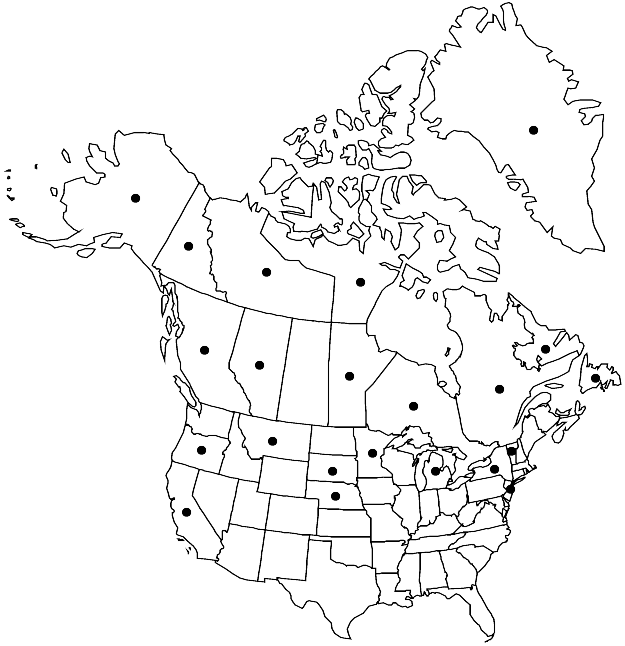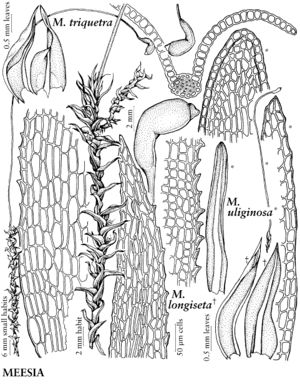Difference between revisions of "Meesia triquetra"
Nova Acta Regiae Soc. Sci. Upsal. 12: 357. 1844.
FNA>Volume Importer |
FNA>Volume Importer |
||
| Line 29: | Line 29: | ||
|elevation=moderate to high elevations | |elevation=moderate to high elevations | ||
|distribution=Greenland;Alta.;B.C.;Man.;Nfld. and Labr.;N.W.T.;Nunavut;Ont.;Que.;Yukon;Alaska;Calif.;Mich.;Minn.;Mont.;Nebr.;N.J.;N.Y.;Oreg.;S.Dak.;Vt.;n Eurasia. | |distribution=Greenland;Alta.;B.C.;Man.;Nfld. and Labr.;N.W.T.;Nunavut;Ont.;Que.;Yukon;Alaska;Calif.;Mich.;Minn.;Mont.;Nebr.;N.J.;N.Y.;Oreg.;S.Dak.;Vt.;n Eurasia. | ||
| − | |discussion=<p>Meesia triquetra is frequent where appropriate habitat is available, and disjunct in a few locations farther south. The species is usually easily distinguished by its three-ranked, widely spreading leaves that have serrulate margins. The sexual condition is dioicous.</p> | + | |discussion=<p><i>Meesia triquetra</i> is frequent where appropriate habitat is available, and disjunct in a few locations farther south. The species is usually easily distinguished by its three-ranked, widely spreading leaves that have serrulate margins. The sexual condition is dioicous.</p> |
|tables= | |tables= | ||
|references= | |references= | ||
| Line 52: | Line 52: | ||
|publication year=1844 | |publication year=1844 | ||
|special status=Selected by author to be illustrated | |special status=Selected by author to be illustrated | ||
| − | |source xml=https://jpend@bitbucket.org/aafc-mbb/fna-data-curation.git/src/ | + | |source xml=https://jpend@bitbucket.org/aafc-mbb/fna-data-curation.git/src/8f726806613d60c220dc4493de13607dd3150896/coarse_grained_fna_xml/V28/V28_34.xml |
|genus=Meesia | |genus=Meesia | ||
|species=Meesia triquetra | |species=Meesia triquetra | ||
Revision as of 17:04, 18 September 2019
Plants 0.1–1.2 cm. Stem leaves contorted when dry, wide-spreading and distinctly 3-ranked when moist, ovate-lanceolate, 1.5–4 mm; base decurrent; margins plane to weakly reflexed proximally, serrulate distally; apex acute; costa narrow, ending in or just before apex; inner laminal cells smaller, walls thicker than marginal cells. Sexual condition dioicous. Seta 3–10 cm. Capsule 3–4.5 mm. Spores 33–38 µm.
Habitat: Rich fens, arctic and boreal areas
Elevation: moderate to high elevations
Distribution

Greenland, Alta., B.C., Man., Nfld. and Labr., N.W.T., Nunavut, Ont., Que., Yukon, Alaska, Calif., Mich., Minn., Mont., Nebr., N.J., N.Y., Oreg., S.Dak., Vt., n Eurasia.
Discussion
Meesia triquetra is frequent where appropriate habitat is available, and disjunct in a few locations farther south. The species is usually easily distinguished by its three-ranked, widely spreading leaves that have serrulate margins. The sexual condition is dioicous.
Selected References
None.
